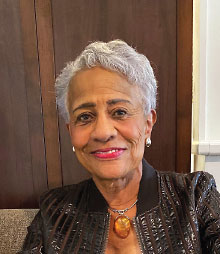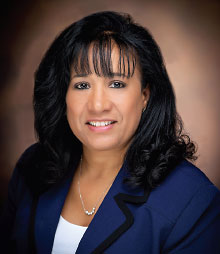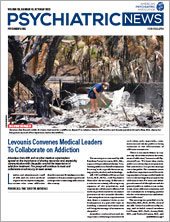“Arguably, every aspect of the psychoanalysis that we know today bears the marks of racism, oppression, and inequality to one degree or another. ... This does not mean that we should dispense with all, but it does mean that we must have the courage to boldly commit to revisioning, revising, reorganizing, and reconstructing this alive, ever-evolving body of thought that we call psychoanalysis.”
—Holmes Commission on Racial Equity in American Psychoanalysis
The
Holmes Commission Report on Racial Equity in American Psychoanalysis, released on June 19 (Juneteenth) this year and posted on the website of the American Psychoanalytic Association, found that the ghosts of a society historically structured by race are alive and haunting the training institutes and consulting rooms of psychoanalysis.
The 21-member commission worked for three years meeting monthly, with its leadership—chair Dorothy Holmes, Ph.D., and co-chairs Beverly Stoute, M.D., Anton Hart, Ph.D., and Dionne Powell, M.D.—meeting weekly. They conducted a survey of 2,259 faculty, administrators, staff, and candidates at psychoanalytic training institutes, supplemented by interviews (see
Psychiatric News "
Curriculum, Education Around Race Lacking at Psychoanalytic Institutes, Report Says").
In its report, the commission grouped its findings into five areas—understanding and addressing racism, recruitment, and mentoring; curriculum and supervision in training; racial enactments and institutional responses; and “the experience of race on the couch”—and offered recommendations in each (see
Psychiatric News "
Commission Urges Leaders to Step Up").
The report found, for instance, that psychoanalytic faculty and candidates alike testified to inadequate institutional response to issues of race and racial enactments; that those enactments—instances when racial thinking and racist attitudes become manifest—are ubiquitous; and that recruitment relies too heavily on word of mouth and favors the continuance of a predominantly White membership in psychoanalytic institutions.
The commission also found that faculty and candidates at psychoanalytic institutes, irrespective of race, believe psychoanalytic curricula do not adequately address race and racism.
In an interview with Psychiatric News, Holmes said respondents to the survey reported manifestations of structural racism across all domains of psychoanalytic training and experience. And in a specialty in which the number of people of color is fractional to begin with, “minoritized people are not given the same type of help in terms of progression,” she said. “So, you start with very few, and it is a very few of that very few who end up as training analysts and supervisors.”
Holmes, who is a teaching, training, and supervising analyst in the Psychoanalytic Center of the Carolinas, added that although the report was commissioned by the American Psychoanalytic Association (APsA), its findings and recommendations went beyond the organization and its institutes.
“Many of our respondents were not from APsA, but from independent institutes,” she told Psychiatric News. “Everything we found true about APsA was true everywhere else.”
In a press release issued at the time of the report, APsA president Dan Prezent, Ph.D., said, “The commission was created so that APsA and its members might better understand and repair the impediments to equality in the field of psychoanalysis. ... The report appraises systemic racism in American psychoanalysis, offering recommendations and a path forward to reduce its harmful effects. We encourage reading about and reflecting on these historically significant findings and sharing them far and wide.”
Escaping the Trap of Accusation and Blame
Unsparing as the report is in its findings, commission members said an important illuminating revelation from their work together is that racial thinking and attitudes, in a society historically structured by race, are inevitable and unavoidable.
“We had to face with some humility that we ourselves could not escape manifestations of systemic racism,” Holmes said. “We developed a process model for our discussions that allowed us to see that there is no way to address systemic racism without it coming to the fore among those who are trying to process it. No matter what your experience or commitment or love of equity, you are going to enact something inequitable.”
Hart, a training and supervising analyst and faculty member at the William Alanson White Institute in New York City, said this revelation points to the contribution that a psychoanalytic lens can make to discussions of race and to organizations that are working to address systemic and structural racism. With its unflinching exploration of the most hidden places of the mind, that lens can move people away from the trap of accusation and shame—“you’re a racist,” “no I’m not”—to a collective realization that racism in a racially structured society is endemic.
“One of the implications of the Holmes report is the idea that we all carry racism within us,” Hart said. “That includes people of color, and I include myself in that—a person of color with an African American parent and a Jewish American parent of Eastern European descent. And I am aware of how unconscious a lot of my attitudes are because I live in a society that is structured that way, that has the history that our society has.”
Hart added, “The movement we hope for is away from accusation and a collective move toward presuming that racism resides in each of us and that we could usefully be open to discovering it and being in conversation about it, so that when it comes up, we could prevent its pernicious effects.”
Role of the ‘Social’ a ‘Charged Issue’
Stoute, a training and supervising analyst at the Emory University Psychoanalytic Institute and an elected director at large on APsA’s Board of Directors, underscored that racism within an organization affects everyone and the health of the organization itself. She also has a private practice in child, adolescent, and adult psychiatry and psychoanalysis.
She emphasized, for instance, that White trainees and White analysts—as well as those of color—who responded to the survey reported racial enactments and said that institutional response was negligible or nonexistent.
“Leadership not only doesn’t know how [to respond] but is resistant and blind to the damage that racism causes within institutions,” Stoute told Psychiatric News. “Many people see that. That is encouraging to me because people understand that when a system privileges one group, that group suffers too, and the organization is deprived of being a greater living force.
“That has to be problematic within mental health, psychoanalysis, and the health care system as a whole,” Stoute continued. “We know that implicit bias impacts us at every level of the health care system. We have to change it by first acknowledging that it affects everyone at every level. That damage lives within us.”
The Holmes Commission report is issued at a time of some ferment about the role, more generally, of the “social”—racial, economic, and cultural influences—in psychoanalysis, which has traditionally been so sharply focused on the intrapsychic.
“The place of the social is a charged issue because, for some, classical psychoanalysis allows the analyst to close out the outside world, temporarily, and go ‘deep inside’ the person,” Hart said. “When you introduce the social, some psychoanalysts object—that’s not psychoanalysis, that’s sociology or political theory. But our finding is that the social is very much within us. It’s not a matter of either/or, and you are not departing from psychoanalytic thoughtfulness if you consider the role of society and race as you pursue the fullest psychoanalytic understanding of what it means to be a person.”
Holmes and other commission members stressed that the report should be meaningful and useful to nonpsychoanalysts and to organizations everywhere.
“You don’t need to be a psychoanalyst to pay attention to the role of race or to recognize the psyche and the complex influences on it,” Holmes said. “If you are a psychopharmacologist interested in neurophysiological mechanisms, you can recognize that race has influenced that because of bias and institutional practices. It doesn’t matter what your theoretical orientation is in your particular field; everyone needs to look at how race has operated in our culture generally and within all mental health disciplines.” ■




